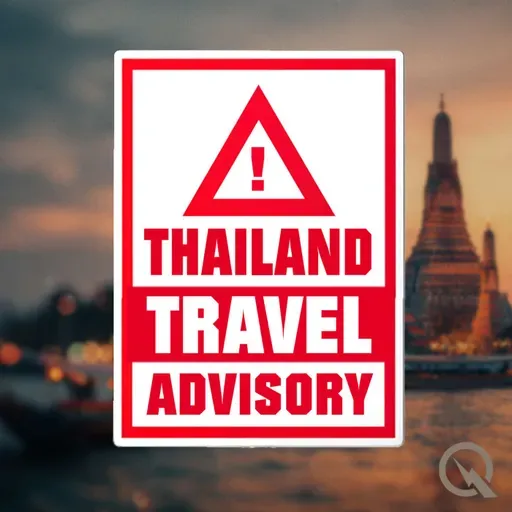
17 September 2025
Thailand Travel Alert: Essential Safety Tips for 2025 - Navigate Border Risks, Urban Challenges, and New Entry Requirements
Thailand Travel Advisory
About
Listeners considering a trip to Thailand should note that while popular destinations like Bangkok, Phuket, Chiang Mai, and most islands remain safe and open for international travel, several recent developments and ongoing concerns require extra vigilance. The United States Department of State currently rates Thailand as a Level 1 advisory for most of the country, meaning travelers should exercise normal precautions. However, both the U.S. State Department and Canadian government have issued Level 4 "Do Not Travel" advisories for Thailand’s border region with Cambodia due to armed conflict and for Thailand’s southern provinces—specifically Yala, Pattani, Narathiwat, and Songkhla—because of ongoing separatist violence and periodic violent incidents. Since July 2025, the 50-kilometer zone along the Thai-Cambodian border remains closed to tourism following clashes that resulted in casualties and mass evacuations. All land crossings between Thailand and Cambodia in this region are closed. Temples and tourist attractions near the border, like Khao Phra Wihan, Ta Kwai, and Ta Muen Thom, are not accessible until further notice according to both Tours4Fun and official embassy advisories.
Travelers should remain alert in Bangkok, where violent incidents, though rare, do occur—such as the July 28 mass shooting at the Or Tor Kor market. Petty crimes like pickpocketing and purse snatching remain the most prevalent risk in major tourist areas, markets, and on public transport. The UK Foreign, Commonwealth & Development Office recommends carrying valuables and cash securely, watching out for bag-snatchers especially on motorcycles, and exercising caution in crowded or open-air venues. Motorcycles and scooters, commonly rented by tourists, present a significant risk, as road traffic accidents are frequent, and many rental vehicles are poorly maintained. The Canadian government and other sources warn that insurance may not be valid if travelers are found to be without a proper motorcycle license or helmet, and they strongly advise against riding motorcycles altogether.
There are also seasonal factors to consider. Northern regions like Chiang Mai and the capital Bangkok may experience hazardous air pollution during the dry months, which can particularly affect those with respiratory conditions, according to Tours4Fun. Holiday periods, including the Thai New Year in April, see a spike in traffic accidents and drunk driving. Night travel on mountain roads during the rainy season, from June to October, is especially dangerous, as these roads can become impassable.
Thailand introduced a new entry requirement from May 2025. All foreign nationals must register and complete the Thailand Digital Arrival Card online within three days before arrival, regardless of point of entry, which is now mandatory for arriving travelers.
While major tourist destinations function normally and see millions of visitors each year, ongoing political tensions and sporadic demonstrations in Bangkok and other cities mean travelers should stay informed through official government advisories and avoid protest areas. For LGBTQ+ travelers, Thailand is widely considered a friendly destination but there are regional variations in attitudes, and Bangkok itself has been rated with relatively low marks for nighttime safety and personal freedoms by the global city safety app GeoSure.
Travelers are advised to exercise heightened awareness, avoid restricted regions, be sensible with valuables, use verified taxi services, and, if possible, purchase comprehensive travel insurance. Staying informed through embassy alerts and adhering to official updates is essential for a safe experience in Thailand.
This content was created in partnership and with the help of Artificial Intelligence AI
Travelers should remain alert in Bangkok, where violent incidents, though rare, do occur—such as the July 28 mass shooting at the Or Tor Kor market. Petty crimes like pickpocketing and purse snatching remain the most prevalent risk in major tourist areas, markets, and on public transport. The UK Foreign, Commonwealth & Development Office recommends carrying valuables and cash securely, watching out for bag-snatchers especially on motorcycles, and exercising caution in crowded or open-air venues. Motorcycles and scooters, commonly rented by tourists, present a significant risk, as road traffic accidents are frequent, and many rental vehicles are poorly maintained. The Canadian government and other sources warn that insurance may not be valid if travelers are found to be without a proper motorcycle license or helmet, and they strongly advise against riding motorcycles altogether.
There are also seasonal factors to consider. Northern regions like Chiang Mai and the capital Bangkok may experience hazardous air pollution during the dry months, which can particularly affect those with respiratory conditions, according to Tours4Fun. Holiday periods, including the Thai New Year in April, see a spike in traffic accidents and drunk driving. Night travel on mountain roads during the rainy season, from June to October, is especially dangerous, as these roads can become impassable.
Thailand introduced a new entry requirement from May 2025. All foreign nationals must register and complete the Thailand Digital Arrival Card online within three days before arrival, regardless of point of entry, which is now mandatory for arriving travelers.
While major tourist destinations function normally and see millions of visitors each year, ongoing political tensions and sporadic demonstrations in Bangkok and other cities mean travelers should stay informed through official government advisories and avoid protest areas. For LGBTQ+ travelers, Thailand is widely considered a friendly destination but there are regional variations in attitudes, and Bangkok itself has been rated with relatively low marks for nighttime safety and personal freedoms by the global city safety app GeoSure.
Travelers are advised to exercise heightened awareness, avoid restricted regions, be sensible with valuables, use verified taxi services, and, if possible, purchase comprehensive travel insurance. Staying informed through embassy alerts and adhering to official updates is essential for a safe experience in Thailand.
This content was created in partnership and with the help of Artificial Intelligence AI